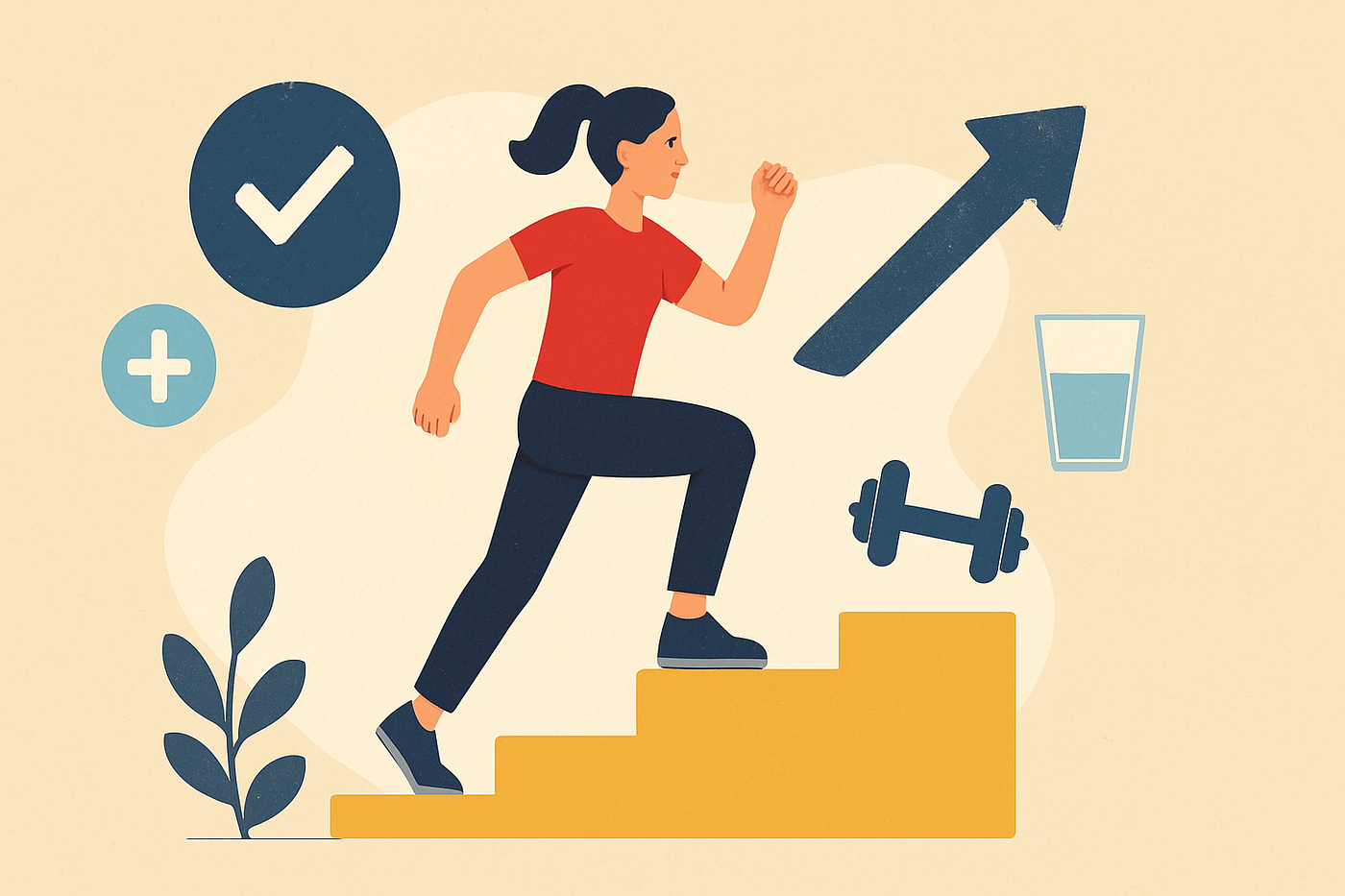
Micro-Habits That Compound Into Massive Life Improvements
The Hidden Power of Small Actions
Big life changes rarely come from dramatic gestures. They come from the smallest, most consistent actions – micro-habits. These are simple, repeatable behaviors that, over time, create exponential growth in health, mindset, and productivity.
Micro-habits don’t demand motivation or willpower. They rely on repetition. When practiced daily, they reprogram your brain’s pathways and slowly shift your identity. The science of compounding doesn’t just apply to money – it applies to behavior too.
The Science Behind Habit Formation
Every habit begins as a behavior loop: cue → routine → reward. Your brain recognizes a pattern, attaches pleasure to it, and repeats it automatically. This process is powered by dopamine, the chemical that reinforces consistency.
Behavioral researchers explain that forming a habit takes between 21 and 66 days, depending on complexity. Each repetition strengthens the neural connection. Over time, it takes less effort to perform – until it becomes automatic.
This is how brushing your teeth, checking your phone, or drinking coffee at the same time daily became effortless routines. The same mechanism can be used deliberately to form positive habits.
Compounding Effect – Why Micro-Habits Multiply Results
A small action done consistently compounds over time. Improving by just 1% per day doesn’t seem like much – but mathematically, that’s a 37x improvement in a year.
That’s the secret of compounding: small gains multiplied by consistency create exponential growth.
Unlike big resolutions, micro-habits are frictionless. They don’t trigger resistance or overwhelm. You don’t need to “change your life” – you just need to change your day.
When these tiny actions accumulate, they shift how you think, perform, and respond to challenges. Progress stops being an event; it becomes a lifestyle.
Foundational Micro-Habits That Transform Health
Your body reflects your habits, not your intentions. A few micro-habits can dramatically improve health and energy:
- Drink water before coffee. This resets hydration and supports metabolism.
- Stretch for 2 minutes in the morning. Simple movement wakes your muscles and boosts blood flow.
- Go to bed 15 minutes earlier. Compounding rest improves focus and mood.
- Walk daily. Even 10 minutes of walking improves cardiovascular health and lowers stress hormones.
For a deeper understanding of how these habits affect your body and overall health, consider learning more about Body Mass Index (BMI) and its importance. These habits are small enough to repeat, yet powerful enough to trigger measurable physiological change. Over months, they compound into better sleep, focus, and resilience.
Mental Micro-Habits That Rewire Thinking
The brain adapts to the thoughts you feed it. Micro-habits shape mindset by reinforcing awareness, gratitude, and calmness.
Try these:
- Write one positive note daily. Train your brain to notice progress.
- Limit negative self-talk. Replace “I can’t” with “I’m learning.”
- Reflect before sleep. Ask: What went well today?
Neuroscience calls this neuroplasticity – the brain’s ability to reorganize itself through experience. Reflection strengthens awareness. Gratitude activates optimism. Over time, these micro-habits reshape how you perceive challenges.
Productivity Micro-Habits for Career and Creativity
Massive professional growth comes from mastering consistency, not chaos.
Modern workers lose up to 2 hours daily from task-switching and distraction. Micro-habits counter this by anchoring attention:
- Start the day with one focused task. No notifications. No emails. Just flow.
- Use the two-minute rule. If something takes less than two minutes, do it immediately.
- Track one key metric daily. Progress measured is progress multiplied.
These small adjustments boost productivity, creativity, and output quality – without burnout. They transform scattered effort into deliberate mastery.
Emotional and Social Micro-Habits
Emotional intelligence grows from intentional practice. Relationships improve not through grand gestures, but through daily empathy.
Micro-habits that strengthen connection include:
- Send one kind message each day. Gratitude compounds through expression.
- Listen five minutes longer before replying. Listening builds trust and understanding.
- Smile intentionally. It regulates your nervous system and affects others’ mood.
Empathy builds trust. Consistency in kindness builds credibility. These subtle actions shape emotional resilience and stronger human bonds.
Measuring Progress – Turning Habits into Systems
Habits become sustainable when tracked. Tracking increases success rates by 42%.
Instead of chasing goals like “get fit” or “be productive,” focus on systems:
- Track how often you do the habit, not the result.
- Review your streaks weekly.
- Reward consistency, not perfection.
Systems remove emotion from progress. You stop judging results and start trusting the process. Progress becomes measurable – and motivation becomes automatic.
Use simple tools: habit-tracking apps, spreadsheets, or pen-and-paper charts. Data gives feedback, and feedback sustains momentum.
Real-World Example – The Ripple Effect of Consistency
Consider someone who commits to just three micro-habits:
- Wakes up 30 minutes earlier to plan the day.
- Walks 15 minutes after dinner.
- Reads two pages before bed.
After 90 days, they’re sleeping better, thinking clearer, and working with focus. None of these habits feel extreme – but together, they reshape identity.
The person who reads two pages nightly eventually becomes a reader. The one who walks daily becomes active. Small steps redefine self-image, and identity fuels sustainable change.
See also: Inside the Style Power of Chrome Hearts Clothing
Technology’s Role – Tracking and Precision
Digital tools make habit tracking effortless. You can now measure calories, focus time, heart rate, and daily steps in real time.
Precision encourages persistence – which is why modern tech complements behavioral science. Tools and trackers transform vague effort into clear feedback loops.
For instance, calculation-based tools provide instant insight for measurable improvement. Just as CalculatorPoint.net offers precise digital computation for everyday users, technology enables people to calculate, measure, and optimize their progress with accuracy.
In the same way calculators simplify numbers, habit trackers simplify self-growth – giving data the power to guide behavior.
The Future of Micro-Habits – Data Meets Psychology
The next evolution of self-improvement merges AI, psychology, and daily analytics. Smart systems now analyze behavior patterns to recommend micro-habits that align with goals.
Wearables measure stress and suggest breathing exercises. Productivity apps track attention spans and nudge users to refocus. AI wellness assistants learn your patterns and adjust routines automatically.
The fusion of data and psychology turns habit-building into a guided, personalized experience – one that’s intelligent, adaptive, and human-centered.
See also: Inside the Style Power of Chrome Hearts Clothing
Conclusion – The Smallest Step That Changes Everything
Massive transformation doesn’t begin with grand plans – it starts with micro-actions. Small steps compound into strength, discipline, and clarity.
When you drink water before coffee, read a page before bed, or reflect for two minutes, you’re not just doing an action – you’re voting for a new identity.
Every micro-habit you repeat builds the architecture of your future self. Over time, small becomes strong. Consistent becomes powerful. And simple becomes transformational.
The equation for self-improvement is no longer a mystery – it’s math. Tiny habits + daily repetition = massive life improvement.




